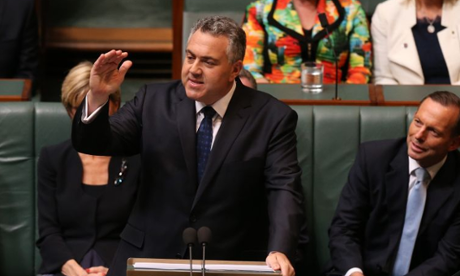Matt Grudnoff, Andrew Leigh, Trisha Jha, Laura Eadie, Frank Bongiorno, Ged Kearney theguardian.com, Wednesday 14 May 2014
Australian Budget 2014: the panel verdict
Matt Grudnoff, Andrew Leigh, Trisha Jha, Laura Eadie, Frank Bongiorno and Ged Kearney all weigh in on Joe Hockey's first Budget
Joe Hockey delivers his first budget. Photograph: Mike Bowers/for Guardian Australia
Andrew Leigh: 'Plenty of goodies for cigar-chomping plutocrats, but not much for a minimum wage worker'

In her terrific book Dirt Cheap, the late Elisabeth Wynhausen decided to take leave from her journalism job and try life as a low-wage worker. In one job, Wynhausen moved to a country town and worked packing eggs. She earned near minimum wage in a job that started at 6am, left her body aching at the end of the day, and where the smell from the nearby chook sheds was constant. Three weeks in, the manager, a millionaire several times over, came to tell the workers they were losing their jobs.
I thought of Wynhausen's story again last night as I looked at the budget papers. For the billionaires: a mining tax cut and a parental leave scheme that gives most to those who have most. For the battlers: cuts to the pension, cuts to family support, and a punitive regime for young jobseekers.
After a generation of rising inequality, the Abbott government has delivered a budget that will widen the gap. In an environment when the three richest people in Australia have more wealth than the bottom one million, the government is cutting foreign aid and student support to make room for tax breaks to multi-millionaire superannuants and multinational firms.Budgets are about priorities. This is a budget that has plenty of goodies for cigar-chomping plutocrats, but not much for a minimum wage worker at an egg factory, who will be forced to work till 70 before getting the pension. For Canberrans, it will be particularly brutal, with many of the 16,500 public service job cuts sure to fall on the nation's capital. These include people like the unemployed constituent who contacted me yesterday, fearful that if her husband lost his job too, they wouldn't be able to pay the mortgage.
What Joe Hockey didn't tell people last year was that his own decisions had doubled the deficit. What he didn't tell people last night was that he couldn't even manage to halve it again. He's left Australia with a whole lot of broken eggs, but no omelette in sight.
• Andrew Leigh is the shadow assistant treasurer
Matt Grudnoff: 'This 'budget crisis' is a political fabrication'

At a time when unemployment is rising, economic growth is sluggish and our terms of trade are in decline, the government has decided to take $36bn out of the economy. Usually economists suggest the budget is used to counter the business cycle. That means when the economy is declining, the government should spend more and tax less. Pulling money out of the economy will push economic growth down and put upward pressure on unemployment.
The primary reason the government has given for such large cuts is that the budget is in crisis. This of course is just political fabrication, as any economist will happily tell you. As the budget papers reveal, with the economy growing below trend, revenue is down as a percentage of GDP from its long run average. If the economy is allowed to recover, tax revenue will also recover. Big cuts to the budget now have the potential to slow that recovery and hence the recovery of tax revenue.
While there are some tax increases to the well off, motorists and the sick, there are also big tax cuts to large mining companies, big polluters and businesses. In fact while most of the $36bn comes from middle and low income households, big business, particularly mining companies are likely to be much better off. The government might be keen to say that we all have to do our share but it seems big business is getting a free ride on the backs of the less well off.
• Matt Grudnoff is a senior economist at The Australia Institute
Laura Eadie: 'Independent institutions are being axed in what amounts to false economy'

This budget is about the national interest. It's meant to prepare for structural change and drive economic sustainability. But will it?
It's promising to see a government grappling with the economic implications of an ageing population. Even if it comes after 12 years, three intergenerational reports – and one very distracting mining boom that both major parties hoped was a structural change, but that ultimately wasn't.
What's missing is an understanding of the real structural changes taking place in the global economy. Ageing is just one global mega-trend challenging economic growth. Other trends are as big or bigger. We're heading into a carbon constrained world. In Asia particularly, we're seeing a race to control resources and win advantage in green technology.
Whether Australia is ready or not, our economy will be reshaped by these trends. Arguably, it already is. Coal prices have collapsed as China moves to aggressively cut growth in coal use. Domestic gas prices are surging as we move to export our reserves offshore. Rooftop solar has taken the cream off coal-fired power profits as its price dropped 7-fold in four years, again mostly due to China.
Rapid change to our economic structure is inevitable. Forward looking policy, and independent institutions, will be essential to make it a smooth - or at least less bumpy - ride. That's where this budget falls down. Rewind a few years, and we had bipartisan agreement on key policies for resources and carbon management. Today, we see independent institutions being axed in what amounts to false economy.
Cutting the National Water Initiative may save $20.9m over four years. Yet spreading its responsibilities amongst un-named agencies hardly inspires confidence that water management won't become a political football again.
Axing ARENA may save $1.3bn over 5 years. Yet it could cost us a lot more in the future, if we miss the opportunity to make Australian renewable energy competitive.Joe Hockey is right that we're facing an emergency. We do need to prepare for economic risks before it's too late. But delaying action to develop a sustainable economy will cost us all in the long-run.
• Laura Eadie is the research director for the sustainable economy program at the Centre for Policy Development
Frank Bongiorno: 'Pain for many, but no sharp break with the past'

"We are a nation of lifters, not leaners." Hockey's budget speech borrowed these words from Robert Menzies' The Forgotten People broadcast of 1942. The budget itself recalls the Menzies government's so-called "horror Budget" of 1951.
The Abbott government has tried to justify its harsh budget by claiming the existence of an emergency. In 1951, with inflation running at 20%, the treasurer Arthur Fadden's claims of an emergency were more plausible, but they did not prevent a very rough public reception for a budget that increased taxes across the board. The Hockey budget will probably receive similarly rough handling. Only professional economists seemed to think Fadden's budget any good. They'll also have kind words for Hockey's.
Some historians have been more kind to the "horror Budget", pointing out that it correctly attacked the problem of excess demand, and that did so not by the time-honoured orthodox method of simply cutting spending but by dealing with the revenue side of the equation. This was good Keynesianism, even if it did not prevent a recession.
Hockey won't rationalise his infrastructure spending in Keynesian terms. It's clearly designed as a political pay-off for higher petrol taxes, just as the Medicare co-payment, far from producing the bad outcomes about which health experts have warned, will apparently help find a cure for cancer. Nor has Hockey done anything much on the revenue side, with the three-year levy on the rich performing more of a political than a financial function.
Hockey began his budget speech claiming that the country's future depended on his budget. He's not the first federal treasurer to make exaggerated claims of this kind. Paul Keating's 1988 budget, with its massive surplus, was going to bring "home the bacon". What followed was "the recession we had to have".
Treasurers are often poor guides to historical significance: the most significant budgets have usually only gained due recognition in retrospect. The apparent importance of Bill Hayden's only budget as treasurer in 1975 was that it was blocked by the Senate, leading to the dismissal of the Whitlam government. Hayden's budget actually mattered much more for quite different reasons; it was an exercise in economic rationalism and therefore the granddaddy of pretty much every federal budget ever since, including Hockey's.
There's no reason to suspect that Hockey's budget carries any such significance. It will deliver pain for many, but no sharp break with the past. It attacks the supposed entitlements of some – mainly the poor – while leaving rackets such as negative-gearing in place. Above all, it does nothing to deal with the elephant in the room; that the federal government is failing to collect enough revenue to do what the majority of Australian people still expect of it.
• Frank Bongiorno teaches history at the Australian National University
Ged Kearney: 'The cuts will reduce the quality of public services that Australians receive'

Budgets are a chance for governments to set out their vision for the country, and today revealed that Tony Abbott and Hockey's vision is of a harsher, less equal Australia.
There are so many cuts to the social safety net in this budget, it's hard to know what's the worst. But the almost complete abandonment of support for young unemployed people stands out. If you're under 30 and unemployed, you're on your own for six months, with no income support at all. After that, you'll get inadequate welfare payments for six months and be required to work for the dole, a scheme that has been shown to be counterproductive.
You'd think a government that was concerned about getting people into work and boosting productivity would emphasise training programs and skills development, but you'd be wrong. The government has gutted support for skills and training by cutting half a billion in funding as well as scrapping a range of key agencies (like the Australian Workforce Productivity Agency) to be abolished and funding for key programs (like support apprentices) scrapped.
The savage cuts to public sector jobs will not only put more than 16,500 hard-working Australians out of a job, it will reduce the quality of public services that Australians receive. You'll wait longer on the phone to Medicare or the Tax Office, and stand longer in Customs queues. These cuts are unwarranted, short-sighted, and come on top of years of tight budgets in the public sector.
For working people, this budget represents an attack on the social wage – the public services and social safety net that are so important to our way of life. Universal health care is being fundamentally undermined. The Age Pension, Disability Support Pension and other payments will be cut, as will family payments.
There are a few superficial measures that make it seem as if the pain in this budget is being shared broadly, like the deficit levy that will only affect the top few per cent of income earners. But these are distractions from the real pain, which will hit the young, the poor, people with disability, retirees, apprentices, tertiary students, families, and anyone who might need to go to the doctor but now can't afford it.
• Ged Kearney is president of the ACTU
Trisha Jha: 'Some progress has been made towards fixing perverse incentives'

The reforms to family tax benefits are the most significant since the current policies were first introduced as part of the GST reform package.
Family Tax Benefit Part B was designed for families with one main earner and single parents, with a slightly higher payment for those whose youngest child is under five. In the Budget, the primary earner income test has been brought down from $150,000 to $100,000. Income support customer statistics suggest this change would affect under 100,000 families. The major change is that new applicants whose youngest child is aged six or over are no longer eligible for FTB Part B at all. This would remove some of the workforce disincentives for secondary earners in couple families who have primary school-age children.The changes also amount to a significant reduction in benefits for single parents. The new $750 supplement attached to the maximum rate of FTB Part A for single parents of children aged 6-12 is intended to ameliorate this, but the yearly loss is in the thousands.
The changes to FTB Part A represent a missed opportunity for real reform. The Commission of Audit recommended abolishing the second income test for the payment, which simplified four tiers of payment to just a maximum rate and a part rate which reduced to nil with a 20c taper. However, the government has gone for the blunter option and merely removed the per-child additional income threshold. At least 107,000 families will be cut off payments with the effect of trimming some fat, as payments will now cut out around $94,000 in income. Unfortunately, it does little to reduce complexity: there are still three tiers of payment because the part rate reduces to the base rate before the hard cut-off.
This budget was always going to be about cuts and not wholesale reform, but some progress has been made towards fixing perverse incentives.
• Trisha Jha is a policy analyst at The Centre for Independent Studies
Australian Budget 2014: the panel verdict | Comment is free | theguardian.com

EmoticonEmoticon